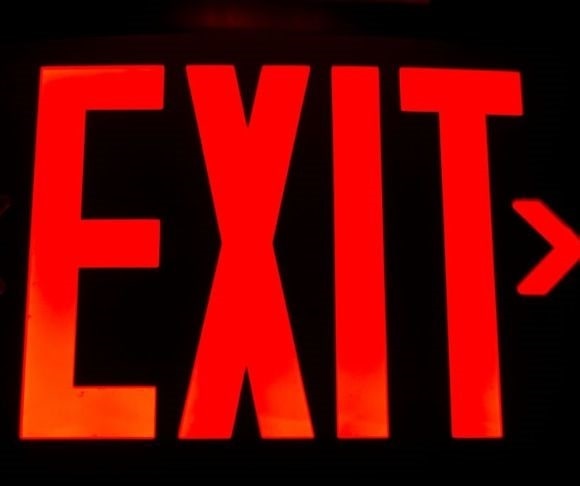



Moving isn’t cheap – yet the California exodus continues. So many people and businesses are moving out that the Golden State lost nearly $350 million in tax revenues in 2021, a figure likely to increase when more recent numbers are released. What is causing the great relocation – and will Gov. Gavin Newsom really try to impose an “exit tax” on fleeing folks?
According to recent polls, the number one reason Californians want to leave is because it is just too expensive to live there. The California Community Poll found that four in ten residents are considering an exit from the Golden State, with most laying the blame on the cost of living. In 2020, 41% felt satisfied with the economy, but now only 29% feel the same way. Nearly half of the survey takers said they get by but struggle to save money, and more than a quarter said it is tough just to make ends meet.
“Residents are largely dissatisfied with the cost of their healthcare, the amount they pay for their home, and the cost of everyday living expenses (18% satisfied, 81% dissatisfied),” the poll explained. The population has dropped by about 500,000 people since 2020, when the trend to leave California first gained momentum. Logan Mohtashami, lead analyst for HousingWire, told USA Today that a big part of the problem is that there’s not enough housing for the demand. “The housing market is savagely unhealthy because we still have too many people chasing too few homes,” he explained. “California is going to be a tug of war.”
Among registered voters, 46.8% are Democrat, 23.9% are Republican, and 22.7% say they are independent, according to the Public Policy Institute of California (PPIC). “Forty-one percent of lawmakers are women and ten percent identify as out-LGBTQ, which makes California the first state in the nation to reach proportional representation for LGBT[Q] residents,” Capradio explained. This “has the potential to change the climate of the legislature in terms of bipartisanship, cooperation [and] actual productivity,” Susannah Delano, executive director of Close the Gap, told the outlet.

Gov. Gavin Newsom (Photo by Mario Tama/Getty Images)
With the majority of voters on the left, it’s no wonder there are more conservatives leaving the state than other party supporters. That being said, Democrats are leaving, too, just because of the cost of living. But what about the politics of the state? Do they have anything to do with the exodus? Here are a few recent policies either approved or proposed:
Budget
In 2022, the state had a budget of nearly $100 billion surplus, for the second year in a row. Yet now, California is looking at a deficit of $32 billion. During the pandemic, the state received “$27 billion, more than any other state, including $1.3 billion for L.A.,” The San Diego Union-Tribune reported in 2021. That may be one of the reasons Newsom could spend so much during COVID.
Reparations
A big controversy in the “free” state is slavery reparations. “California’s official reparations task force has estimated that black residents of the state are owed $1.2 million each in compensation for the legacy of slavery, even though the state entered the Union as a free state in 1850,” Breitbart reported in May.
Oil and Gas
Newsom has banned selling gas-powered cars after 2035, which has left the state a bit short on energy. Last year, during a power crisis, people were told not to charge their electric vehicles during certain times of the day. Also, the state had some of the highest gas prices in the nation, with residents paying more than $6 a gallon at the pump.
Crime

(Irfan Khan / Los Angeles Times via Getty Images)
PPIC’S periodic polls found that “Californians’ perception of crime spiked during the pandemic – as did certain types of crime,” and “nearly two in three Californians call violence and street crime in their local community a problem. This includes 31% who call them a big problem, a noticeable increase from February 2020 (24%).” The state’s annual report for 2022 on crime revealed “that the state’s violent crime rate increased by 6.1% since 2021, and property crime was up 6.2%. Homicides dipped very slightly, but robberies jumped by 10.2%,” Cal Matters wrote on its website.
“California ranks first among states experiencing the worst net negative tax income migration. With a staggering net loss of $343.2 million, the Golden State is witnessing an outflow of high-income earners,” reported MyElisting.com.
The Orange County Register quoted a study that tracked business migration patterns from 1990 through 2019. Authored by economists and academics with the Inland Empire Economic Center, the report stated, “The Golden State’s luster appears tarnished in recent years. A seemingly endless stream of firms is leaving the state, citing high taxation, heavy regulation, other business costs and anything but a business-friendly environment.” In 2019, nearly 4,000 establishments moved out, which is 1,915 more than chose to move to California. Furthermore, The Register reported:
“The number of departing establishments was almost double the total in 2012 when 2,237 establishments moved out of state, the figures show. California experienced a net loss in 29 of the 30 years since 1990. In all, 37,313 business establishments moved to California from 1990 through 2019, while 54,630 moved out, for a net loss of 17,317 during that 30-year period, the data shows.”
Charles Schwab, Hewlett Packard Enterprise, Oracle, Tesla, and Toyota are some of the companies that relocated their headquarters in recent years. Stanford University reported at least 352 businesses moved from 2018 to 2021, which included 11 Fortune 1,000 companies. “Headquarter relocations are accelerating substantially, with no sign of reversing course,” according to a Hoover Institution report. It claims the business environment “ranks near the bottom of all U.S. states.”
Newsom has his hands full trying to keep people and businesses in the state, but his proposed exit tax isn’t gaining him any friends. If you make $30 million a year and wish to leave California, the governor wants you to pay 0.4% tax to do so. The idea behind this is that individuals and companies benefited from the state’s resources and tax breaks. If this proposal is approved, it would make California the first state in the nation to levy such a tax.
